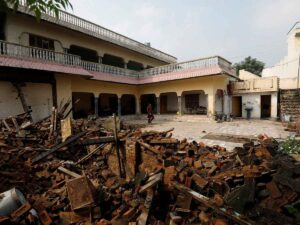Pakistan: Residents of Balochistan’s Quetta, Mastung hold protest against gas shortages amid cold
Balochistan [Pakistan], December 8 (ANI): Residents of Quetta took to the streets in protest against gas shortages amid the cold. The protesters chanted slogans against the administration. This demonstration followed a similar protest in Mastung, where locals had blocked the Quetta-Karachi National Highway to express their frustration over the lack of gas and electricity, The Balochistan Post reported.
In Quetta, residents, including those on Spinny Road, have been facing extended gas load-shedding, severely disrupting daily life. Protesters on Spinny Road blocked the street to express their frustration over how the gas shortage has halted essential household activities, such as cooking and heating, amid the harsh winter conditions, as reported by The Balochistan Post.
In Mastung, protesters earlier voiced their anger over having to pay inflated utility bills on time while being denied essential services like gas and electricity. Their sit-in caused a traffic standstill on the Quetta-Karachi National Highway.
According to the report, frequent protests demanding basic services like water, electricity, and gas have become common in Balochistan. Demonstrators have accused the government of neglecting their needs, arguing that people are being forced to live in “stone-age conditions.”
Criticism of the Balochistan government went beyond gas shortages, as residents highlighted shortcomings in health, education, and other essential services. Protesters warned that if the administration fails to address their issues, they will intensify their protests.
The region faces significant challenges, including poor infrastructure, inadequate educational facilities, and a lack of proper healthcare, all of which contribute to widespread poverty and high unemployment. The exploitation of Balochistan’s natural resources by Pakistan, alongside China’s increasing influence as a colonial power, has worsened these issues and caused immense suffering for the local population.
Furthermore, Pakistan’s decision to cede control of the strategically important coastal city of Gwadar to China has paved the way for large-scale projects like the China-Pakistan Economic Corridor (CPEC), further entrenching these problems.
Notably, human rights violations in Balochistan have been a long-standing issue, with ethnic Baloch people accusing the state of systemic discrimination, marginalization, and denial of political autonomy. The Pakistani government has faced criticism for suppressing Baloch nationalist movements through extrajudicial killings, enforced disappearances, and the torture of activists, journalists, and civilians.






